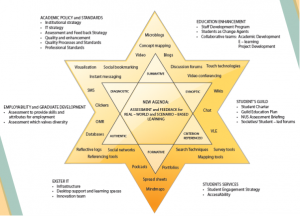One year on for projects in the JISC Assessment and Feedback programme
Five projects from the JISC Assessment and Feedback programme took part in the 2012 International Blended Learning Conference at the University of Hertfordshire on 13-14 June, when representatives from Collaborate (University of Exeter), iTEAM and EEVS (University of Hertfordshire), FASTECH (Bath Spa University and the University of Winchester) and FAST (Cornwall College) presented and sought feedback on their emerging work.
Four of the projects combined in an interactive workshop entitled ‘Aligning assessment and feedback with 21st century needs’ to discuss their evolving work. Themes of sustainability and authenticity of assessment practices, plus the challenges presented by engaging stakeholders such as employers, staff and learners, featured strongly in the ensuing discussions, as has been the case for other projects in the programme. (See the baseline report for the programme: A view of the Assessment and Feedback Landscape (Ferrell, 2012).
Sustainability for many was a key area of interest. Ensuring outcomes are embedded in institutional practice has been one approach taken – for example, providing differentiated information and support on the effective use of electronic voting systems (EVS) and QuestionMark™ Perception™ at the University of Hertfordshire. However, sustainability also involved responding effectively and meaningfully to the views of all those involved. A challenge raised by iTEAM was ensuring the authenticity of the learner voice. Is the involvement of student representatives and the student union sufficient?
Another area for debate was the meaning and relevance to different stakeholders of ‘authentic assessment’. The Collaborate project proposed the term ‘work-integrated assessment’ as an alternative to the ill-defined concept of ‘authentic’ in relation to assessment, highlighting the need for a common language that is meaningful and acceptable to all stakeholders.
The FAST project engaged employers in discussions about the choice of technologies, but noted the fact that appropriate digital (and non-digital) literacy skills were key to the successful transition of learners into the workplace. Employers did not expect learners to be trained in technologies specific to their working environment but did expect entrants to be skilful and appropriate in their use of standard software and their communication with others.
Technology-enhanced formats could generate quality assurance issues, as emerged in the discussion led by the FASTECH project. Ensuring parity in the marking of tech-supported formats and traditional essays called for inventive approaches to writing assignments and marking criteria. The involvement of the many others on whom assessment and feedback innovation has an impact – from administrative teams, learners, external examiners and moderators to quality assurance teams – was an equally vital consideration. The Collaborate project’s star model provided a useful road map for cross-institutional collaboration.
(Collaborate project model of cross-institutional collaboration)
The opening day of the conference included a further presentation by Amanda Jefferies and Marija Cubric of the EEVS project of the emerging findings of a year-long evaluation of the University of Hertfordshire’s roll-out of electronic voting systems, adding to a rich and thought-provoking contribution by JISC teams to the International Blended Learning Conference.
We are now looking forward to ALT-C 2012 (Theme: A Confrontation with Reality) in September in Manchester where projects from the Evidence and Evaluation stand of the programme will be taking part in a symposium on ‘Effectiveness and Efficiency in Assessment and Feedback: Can technology really deliver both?
You can follow the work of projects in the JISC Assessment and Feedback programme on their blogs and find out more about their emerging outputs on the Design Studio.
(Ros Smith, Assessment and Feedback programme synthesis team)

